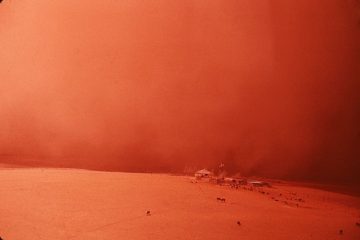David R. Montgomery in Nature:
 Saving the world’s agricultural soils is perhaps the most overlooked environmental challenge of this century. Driving through freshly tilled fields in rural Indiana a few years back, I was struck by how low points retained rich, black earth, yet on the hilltops, the khaki subsoil was completely exposed. I could see the land being shorn of fertility. We urgently need to pay attention to practices that can help to regenerate it. To that end, former columnist for The New York Times Stephen Heyman resurrects an obscure figure from US agricultural history in this engaging biography, The Planter of Modern Life. Heyman’s subject, Louis Bromfield, was a Pulitzer-prizewinning novelist before he became a prominent critic of industrialized farming. Today, Bromfield’s journey of discovery reinforces growing calls to rebuild healthy, fertile soil around the world.
Saving the world’s agricultural soils is perhaps the most overlooked environmental challenge of this century. Driving through freshly tilled fields in rural Indiana a few years back, I was struck by how low points retained rich, black earth, yet on the hilltops, the khaki subsoil was completely exposed. I could see the land being shorn of fertility. We urgently need to pay attention to practices that can help to regenerate it. To that end, former columnist for The New York Times Stephen Heyman resurrects an obscure figure from US agricultural history in this engaging biography, The Planter of Modern Life. Heyman’s subject, Louis Bromfield, was a Pulitzer-prizewinning novelist before he became a prominent critic of industrialized farming. Today, Bromfield’s journey of discovery reinforces growing calls to rebuild healthy, fertile soil around the world.
Little about Bromfield’s life was conventional. Skipping over his childhood in rural Ohio, Heyman follows him through a series of colourful roles, including ambulance driver during the First World War; literary darling of post-war Paris; gardener in southern France; and eventually Hollywood screenwriter. In 1930s France, Bromfield copied his peasant neighbour’s compost-making and mulching process to convert a bare, rubble-filled patch into a fertile vegetable plot. Noting how French gardens had been farmed for centuries, whereas the United States’ soil was blowing away in the Dust Bowl, he realized something was amiss with the modern approach to managing land.
Bromfield then visited the English botanist Albert Howard in India. Howard had travelled there to teach Western agricultural techniques, but ended up documenting traditional Indian methods and adapting them to colonial agriculture — which helped to found the organic movement. On Howard’s farm in Indore, India, Bromfield saw large-scale compost building in action, and absorbed advice to emulate nature to maintain fertile soils.
More here.
